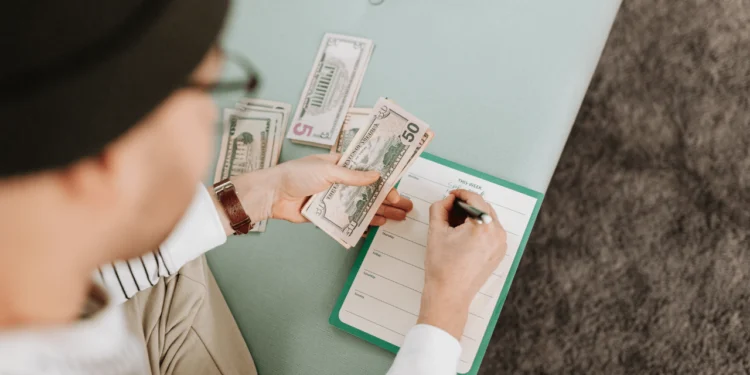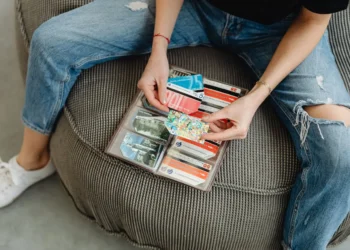When you hear “frugal living,” you might picture clipping coupons and eating ramen for dinner.
Deprivation. Sacrifice. Missing out.
But what if frugality is actually about something entirely different? Like peace, control, and a genuinely calm relationship with money?
We’ve talked before about what frugal living looks like:
- reducing unnecessary purchases
- cutting expenses
- living with less stuff
This isn’t that conversation. This is about how frugality feels and why it might be the mental health strategy you didn’t know you needed.
The Emotional Toll of Financial Uncertainty
Money stress isn’t just uncomfortable. It’s a documented mental health crisis.
Financial worry contributes to sleep problems, chronic anxiety, and depression. 72% of Americans report feeling stressed about money at least some of the time, with many naming it their top source of stress overall.
Living paycheck to paycheck creates a constant low-grade panic.
- Will this expense wreck everything?
- Can I afford this emergency?
- What happens if I lose my job?
Frugal living interrupts that cycle. You stop chasing “just enough” and start building actual stability. The kind that lets you sleep at night without calculating rent money in your head.
Frugal Thinking = Decision Fatigue Reduction
Every purchase is a decision.
- Should I buy this coffee?
- Do I need these shoes?
- Is this grocery item worth it?
Those micro-choices pile up throughout the day, draining your mental energy and leaving you exhausted by decisions that shouldn’t matter.
Frugal habits reduce that load.
When you adopt clear guidelines, like a “needs vs wants” list or a 30-day rule for non-essential purchases, you eliminate hundreds of tiny decisions. You’re not constantly negotiating with yourself.
You already know the answer, which frees up mental bandwidth for things that actually matter: your work, your relationships, your creative projects.
Building Financial Buffer for Emotional Security
Frugality’s greatest emotional gift might be the emergency fund. When you spend less consistently, you save more, and that buffer brings profound relief.
Having three months of expenses saved means unexpected costs don’t trigger panic.
Car repair? Annoying, but manageable.
Medical bill? Frustrating, not catastrophic.
Job loss? Scary, but you have breathing room to find the right next move instead of taking the first desperate option.
That financial cushion translates directly into emotional stability. You’re not walking a tightrope anymore.
Cultivating Gratitude Over Comparison
Frugal living naturally shifts your focus from what you lack to what you already have.
Instead of scrolling through curated Instagram lives and feeling inadequate, you start appreciating your functional car, your cozy apartment, your pantry full of food you already paid for.
This is the shift from a scarcity mindset to a sufficiency mindset.
You’re not missing out. You have enough. Practices like keeping a gratitude list or celebrating small wins reinforce this perspective. You stop spending to keep up with others and start making choices based on your actual values and needs.
Strengthening Self-Control and Money Confidence
Here’s something powerful: every frugal choice builds evidence of your capability.
- Last month, you passed on that flashy purchase and stayed within budget.
- Last week, you cooked at home instead of ordering out.
- Yesterday, you scrolled past those targeted ads without clicking.
Those small wins accumulate into something bigger, like self-efficacy, the belief that you can manage your money. That confidence reduces anxiety because you trust yourself to make good decisions.
You’re not helpless or out of control. You’re capable, and you have proof.
Social Benefits and Reduced Pressure
As your frugal lifestyle becomes normal, peer pressure to spend fades.
You get comfortable saying “no” to expensive dinners or weekend trips that don’t fit your budget. Real friends understand. The ones who don’t probably weren’t adding much to your life anyway.
Frugal and money-conscious communities offer genuine connection without the spending pressure.
Swapping goods, sharing meals, and skill exchanges reduce expenses while increasing belonging. You’re not isolated in your financial struggles. You’re part of a community that values different things than conspicuous consumption.
Guardrails Against Emotional Spending
Understanding your triggers helps you protect yourself.
- Are you vulnerable when stressed?
- Bored?
- Scrolling social media?
Recognizing those patterns lets you build guardrails:
- cooling-off periods before purchases
- accountability partners who check in
- strategic spending fasts
These tools aren’t about punishment. They’re about preventing the guilt, regret, and genuine pain that come from overspending. You’re protecting the future you from present you impulses, and that protection brings peace.
Mindset Shifts You Can Begin Today
Start small.
Journal about money emotions for a week. Note what triggers spending urges and how you feel after purchases.
Set a mini challenge like a no-spend weekend or “use what you have” month to reinforce your sense of control.
Celebrate frugal wins with non-spending rewards: take a walk, call a friend you haven’t talked to in months, spend an hour on that hobby you keep putting off.
You’re training your brain that satisfaction doesn’t require a transaction.
Peace Is the Real Payoff
Frugality saves money. That’s obvious and important.
But the deeper gift is mental balance.
- It’s resilience against financial shocks.
- It’s the confidence that comes from knowing you can handle your money.
- It’s the calm of having enough without constantly chasing more.
Small emotional changes plus consistent frugal habits create long-term peace that no amount of retail therapy can match.
This week, choose one area like food, clothing, or subscriptions, and apply one frugal habit. Then pay attention to how it changes how you feel about money.
Not just your bank balance, but your actual stress level. That’s where the real transformation lives.
















